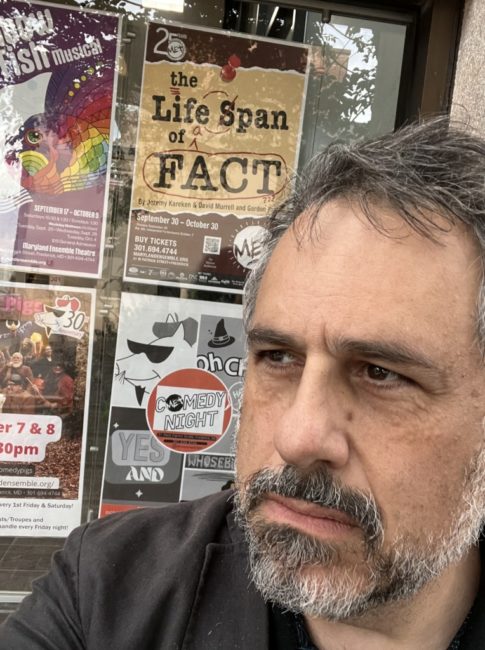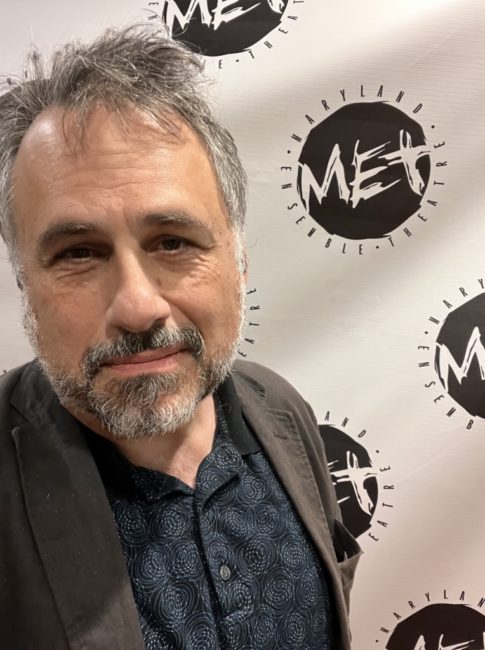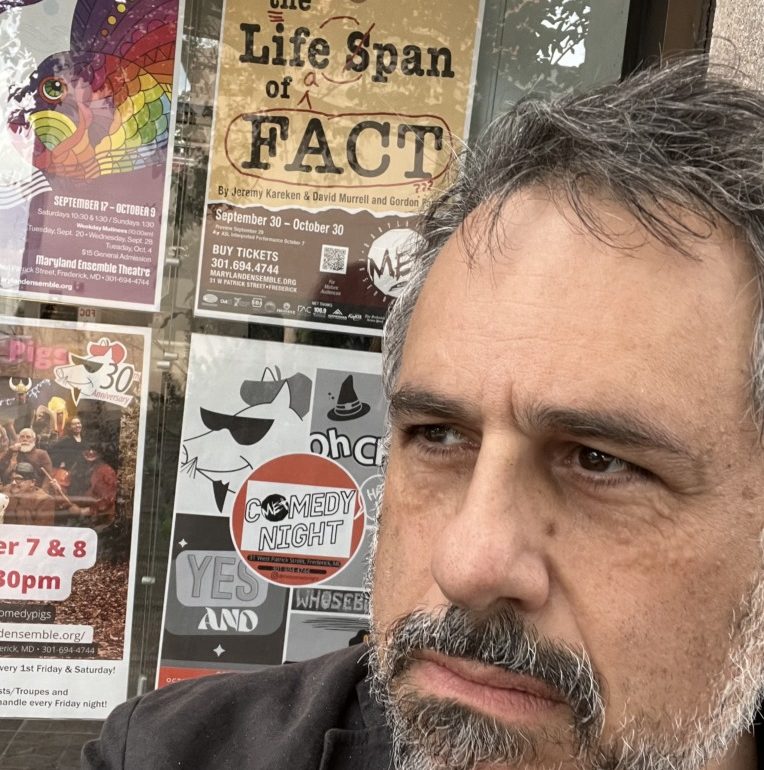“Shorter all the time.” A direct quote from playwright Jeremy Kareken, co-writer of the play The Lifespan of a Fact, based on the book by John D’Agata and Jim Fingal. It’s his definition of the play’s title, when asked, ‘what do you believe is the lifespan of a fact?’ In a sit-down, pre-show interview with Kareken— as the play makes its regional debut at the Maryland Ensemble Theatre this October— we’ve taken a few moments to pick Jeremy Kareken’s brain about the play and the experience of writing it in this ever-evolving era of instantaneous digital information.

Thank you so much for meeting with me, and just before the show too! That really means a lot to both me and TheatreBloom as well as Maryland Ensemble Theatre. We know you’re Jeremy Kareken so we’ll dive right in— tell me, what is it about this play— The Lifespan of a Fact— that made you want to write it?
Jeremy Kareken: That’s a hard question because no one’s ever phrased it quite that way before! But I’ll tell you how the play started. David Murrell, my co-writer and frequent collaborator— he and I work together all the time— called me while I was working on another project. And he asked, “would you be interested in working on another project together?” and I said yes, maybe, why? And he had a book review of The Lifespan of a Fact, the book. And it was such a negative and angry review— it was The New York Times. It was one of two reviews, one of them was somewhat positive and the other one was just furious that anyone would even bother asking the questions posed in the book. For some reason, that review seemed to believe that it was non-fiction. David and I could kind of tell that if anybody is this passionate about something, good or bad, there’s something worth looking at there.
So we took a look at it, we looked at the book, and it was hysterical. It also brought us some very interesting questions for us. Like ‘how has truth been degraded over the years just by the presence of the internet?’ Starting from LexisNexis and all of those news databases on forward. It’s gotten so much easier to put together disparate pieces of information and degrade the truth. We were starting to worry about that. And then there was also the urge by the powers that be to control the messaging, which makes everybody else trust them even less. It’s a long way of saying “that’s why we wrote the play.” The short way of saying it is— we saw an uncomfortable relationship between humanity and fact.
What is it about that relationship between humanity and fact that makes this play relevant to modern audiences?
Jeremy: I don’t know that it is particularly relevant. Everybody seems to think this is some brand-new thing. We started this in 2013/2014. Long before the whole “fake news” thing came out. I don’t think we were prescient. We saw what was going on then and it was going on for a long time before that. The more the media is democratized, the more people have access to some of the same intelligence that previously only the “people working in intelligence” had access to. There’s more knowledge. More knowledge does not necessarily mean more truth. It certainly leads to more facts but it also devalues and inflates the currency of facts. We saw these things happening already and we think it was happening then, it just seems to have sped up, now that everybody’s got the internet in their pocket.
Everybody thinks that research nowadays is just typing something like “vaccine lie” into google, and what comes back is ‘truth.’ What they don’t realize is that google is just going to spit back what you want it to spit back most of the time. People don’t realize confirmation biases. During the time we were writing it, I was very fascinated with Daniel Kahneman’s book Thinking, Fast and Slow. And just how our primitive, human brains interfere with interpretation and our perception of the world as it is. It makes us very susceptible to narrative and not very susceptible to fact.
Is there a moment in the play that really defines what this is about for you?
Jeremy: For me? No! The whole play is it. It’s only 80 minutes. We cut [the book] to the bone so we hope that it is inseparable from itself. If you take a piece out of context or try to isolate any one moment, you’re going to be missing the point.
What was your biggest challenge in putting this together as a stage show?
Jeremy: Our biggest challenge was that much of the book was written in dialogue. It’s a dialogue that’s a correspondence between Jim (Jim Fingal) and John (John D’Agata). We thought ‘hot-diggity-dog!’ this will be easy to adapt, especially once we got this great producer on board— Norman Twain. And he was very helpful. We thought this was going to be an easy commission, we’d just knock it out— it was not easy at all. It’s a book. This is a play. We had to figure out how to dramatize it in a way that would be palatable to a large audience. The producer was of the opinion that this was going to be a Broadway play. He knew it back then. We thought it was going to be some quirky, off-off-Broadway thing. And he said— “you’re out of your mind. We’re going to take this all the way to Broadway and we’re not going to let any of the regional theatres touch it until after it’s been to Broadway.” And we thought that was no way to do things, but he ended up being right. Now, unfortunately, he died two years before the play got up on Broadway, but he was right. It went all the way to Broadway with not so much as two readings before we went into rehearsals.
That is incredible. What’s it like being a Broadway playwright?
Jeremy: You know these days it’s not easy! I just got in after 20 years of trying and then someone sneezes and the world ends. And then when it restarted again, and everyone came back, Broadway says “you’re the old world” and I’m like, “okay, I’m the old world, even though I’ve only been here five minutes…that’s fine…” and the next play is going to be just as hard to get up as the one after that. But we’ll see how it goes! I hope it’s not another 20 years!
How is The Lifespan of a Fact different from other works you’ve written?
Jeremy: I don’t know if it is? I’ll tell you how it’s the same and how it’s different. I usually write comedy and it’s usually somewhat experimental comedy. This is probably the most ‘commercial’ thing that I’ve written. Those choices were partially dictated by our Producer, Norman Twain, who said “this is going to be in a fancy publishing house, not a little house. This is going to be stars doing it, you have to write for stars.” It’s more realism than I’m used to writing.

What is it that you’re hoping people will take away from viewing this 80-minute, start-to-finish, gut-punch, all-inclusive ‘big-house’ piece of theatre that you’ve written?
Jeremy: I think they should talk. One of the wonderful things about theatre— as opposed to streaming at home, alone— is that you watch it with a lot of other people. And I like people. You see it with other people, you go home with some of those people, and you talk about the play. And you say, “isn’t that interesting, what we just saw.” I hope that people talk about it. I hope they come away with questions and not answers.
If you had to sum-up The Lifespan of a Fact and your experience with it in just one word, what word do you use?
Jeremy: My experience with the play or with the concept of ‘the lifespan of a fact?’ Wow. How would I sum up the lifespan of a fact? I’m going to do it in four words— shorter all the time. What’s a word to describe my experience with it? I would say ‘collabvolution.’ It’s a collaboration-evolution. We’ve taken something that was an essay that was into a book and now it’s into a play. And it has all been fictionalized, changed, altered, massaged, for the sake of the story. But it’s all been a wonderful collaboration and evolution all at the same time. I’ve just ben thrilled to be a part of where we got in the end.
The Lifespan of a Fact plays through October 30, 2022 on the Main Stage of the Maryland Ensemble Theatre in the Historic FSK Hotel building— 31 W. Patrick street in downtown historic Frederick, MD. For tickets call the box office at (301) 694-4744 or purchase them online.

